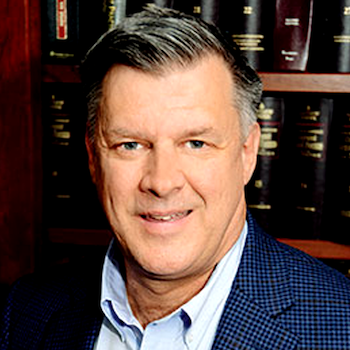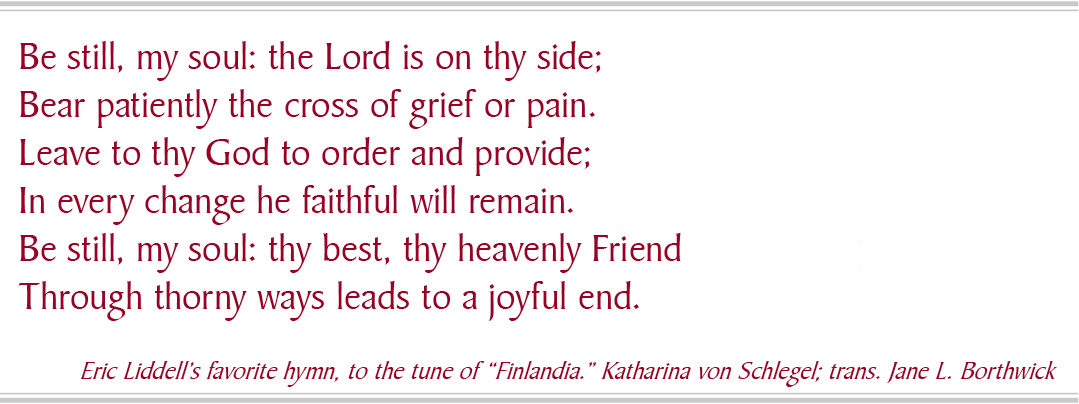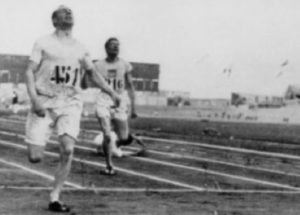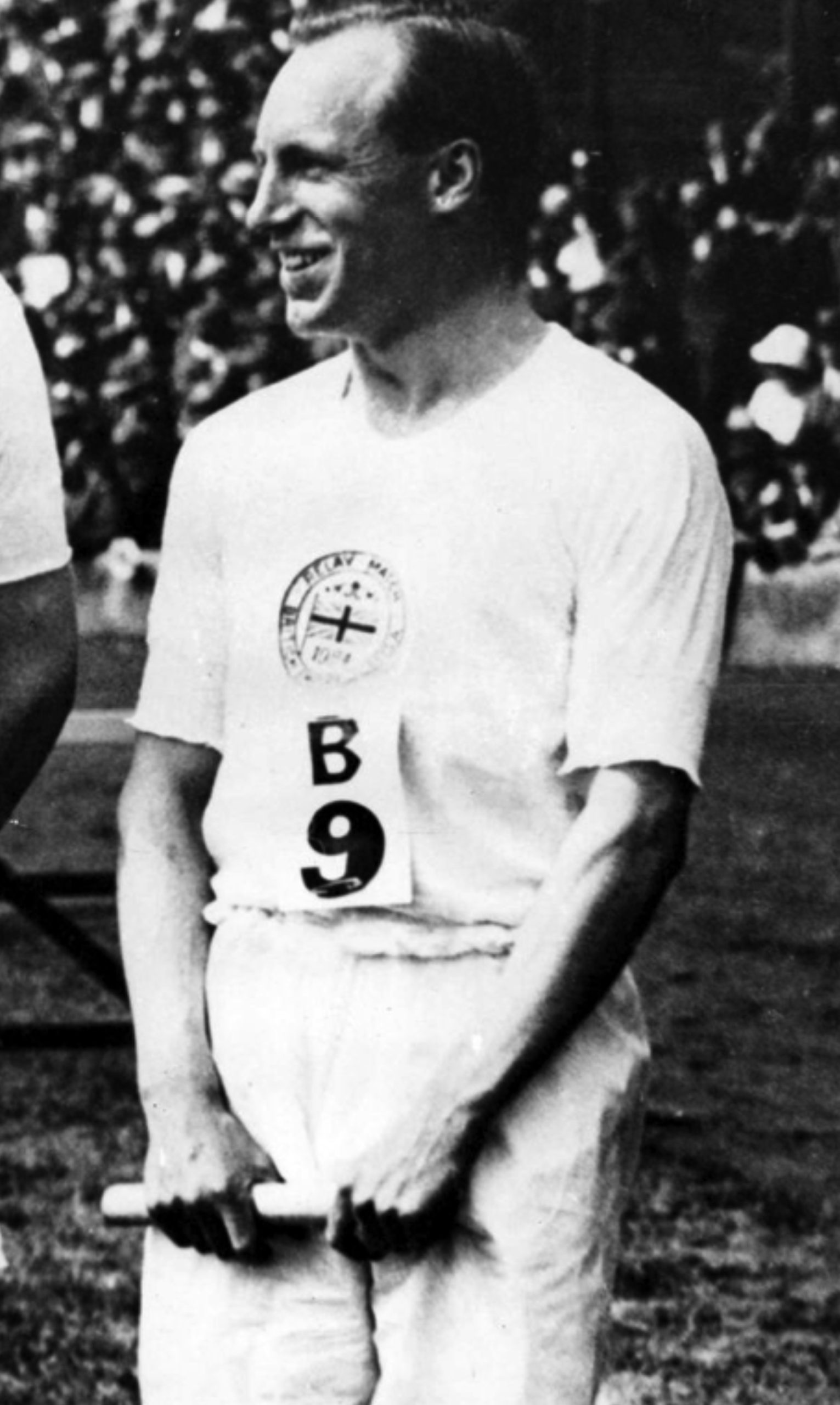Back to series
The Decision
Missionary to China



Muscular Disciple and Olympic Champion
Click here to open a Print - Friendly PDF
With the 2012 London Olympic Games beginning this July, it seems appropriate to remember the life of Eric Liddell, an Olympic hero and disciple of Christ. He may be the best historic mentor and Christian sports star of the past century.
The Son of Missionaries to China James and Mary Liddell were engaged to be married when they arrived in China from Scotland in 1898 to work with the London Missionary Society.
Married in 1899 in Shanghai, they were assigned to Mongolia. Danger, however, loomed on the horizon; in June 1900, a group self-described as the Boxers stirred up hatred among the Chinese against all foreigners, especially the foreign missionaries who were persuading many Chinese to become Christian. The Boxer Rebellion forced the Liddells to flee to a safer region of China.
The rebellion was eventually put down by foreign troops, but not before two hundred missionaries (men, women, and children) and more than thirty thousand Chinese Christians had been killed.
Out of this sacrificial and dangerous context, Mary Liddell gave birth to her second son on January 16, 1902. The boy was originally named Henry Eric Liddell, until a friend pointed out that his initials would be H.E.L. Steering clear of that potentially offensive nickname, James and Mary changed the name to Eric Henry Liddell.
Eric spent the first five years of his life living on a missionary compound in Siaochang. He played with his older brother, Robert, wore Chinese clothes, and spoke Chinese and English. Life within the walls of the compound was safe and comfortable; the missionary children were sheltered from the hardships their parents encountered outside of the compound walls.
Bonnie Scotland and Boarding School
In 1907 Eric, age five, and his family made the long voyage back to Scotland for missionary furlough. Eric and Robert enjoyed the freedom of roaming and exploring the countryside, something they’d been unable to do in China. However, after a wonderful year together as a family, Eric’s parents enrolled the boys in London’s School for the Sons of Missionaries and returned to China.
It would be seven long years before the boys saw their mom again and thirteen before they were reunited with their dad. The teachers and students of the boarding school would become their new family. Fortunately Eric had his older brother, Robert, as his best friend and protector. The two bonded loyally to each other for life.

The boarding school included a strict regimen of academics, character training, Christian teaching, not-so appetizing meals, some hazing, and, fortunately for the Liddells, a healthy dose of exercise and athletics. The English believed that sports taught boys the concepts of fair play, teamwork, and respect for authority.
In 1912 the school moved to a new location with a magnificent playing field and changed its name to Eltham College. As Eric entered the teen years, he discovered a love for math and science under the tutelage of Master D.H. Burleigh, an enthusiastic chemistry teacher who happened to be a former track star. After playing the part of Dormouse in Alice in Wonderland, Eric was given the nickname “the Mouse,” because it fit his shy and quiet personality.
But on the athletic field, Eric made some noise. Both Robert and Eric were soon recognized as the top athletes at Eltham. They led the rugby team, and in 1918, just before Robert’s graduation, Eric and Robert alternated taking first and second place in six of the nine track and field events on the Annual Sports Day.
Their secondary school years, however, were completed during the horrific backdrop of World War I. A number of their classmates paid the ultimate price on the battlefields of France. As a result, Eric’s headmaster ingrained in the boys the responsibility Christians have to “play the game” of life with integrity, courage, and conviction. Eric’s actions later in life showed clearly that he had taken this important message to heart.
University Rugby and Track Star
Upon graduation from Eltham College, Eric followed his older brother to Edinburgh University. Robert set his sights on becoming a missionary doctor. Eric planned to study math and science. He also looked forward to the return of the rest of his family to Scotland. They would all be together for the first time in thirteen years.

As Eric started his studies, he played rugby from time to time. When his classmates noticed his blazing speed, he was asked to compete in the University of Edinburgh Varsity Sports meet.
A friend helped train him for the event. When Eric won the 100-yard dash and came in second, behind Scotland’s fastest in the 220-yard race, he was immediately selected to represent Edinburgh in the Scottish Intervarsity Sports competition.
Not only was his speed recognized, but a number of people commented on his odd running style. One man was heard to say, “Quite an ungainly action, that lad.” His friend replied, “Aye, but he beat Stewart once and almost again.
Odd style or not, he’s fast!”1 Eventually coaches tried to change his running mechanics and competitors wondered how he managed to run so fast with such bad form. Later it would be reported in the British paper, The Guardian,
He is remembered among lovers of athletics as probably the ugliest runner who ever won an Olympic championship. When he appeared in the heats of the 400m at Paris in 1924 his huge sprawling stride, his head thrown back and his arms clawing the air, moved the Americans and other sophisticated experts to ribald laughter.2
But Harold Abrahams, who won the 100-meters gold medal in the Paris Olympics reasoned, “People may shout their heads off about his appalling style. Well, let them. He gets there.”3
During the summer of 1921, Eric went on to win the 100- and 220-yard races at the Scottish Inter-University Games and many other races as well. He won so many gold and silver cups, plates, and other valuable prizes that his mom actually was worried that someone might try to rob their home.
The Glasgow Herald wrote, “E.H. Liddell, Edinburgh University A.C., is going to be a British champion ere long, and he might even blossom into an Olympic hero . . . Liddell, as much because of his supreme grit as because of his pace, is a great figure in modern athletics.”4
In the fall of 1921, Eric and his brother Robert played rugby for Edinburgh University. While only five-foot-nine and 155 pounds, Eric’s speed and determination made him an instant rugby star at the wing position. He was selected to play on the Scottish national team in 1922. He and his former schoolboy partner, Leslie Gracie, made a powerful “Gracie-Liddell Wing” combination.
Over the course of his short rugby career, Eric played for Scotland in seven games and was on the winning side six times. The greatest win was against Wales, which Scotland hadn’t beaten since 1870. That win helped make Eric Liddell a hero among the working class of Scotland who admired the toughness and skill required to be a world-class rugby player.
The Decision
 Eric’s status as a Scottish national team rugby player and Scottish sprint champion gave him the platform that he would soon use to further the gospel of Jesus Christ. In the spring of 1923, one of Robert’s friends, D.P. Thomsen, was struggling to find a way to reach the working class men and miners of Scotland.
Eric’s status as a Scottish national team rugby player and Scottish sprint champion gave him the platform that he would soon use to further the gospel of Jesus Christ. In the spring of 1923, one of Robert’s friends, D.P. Thomsen, was struggling to find a way to reach the working class men and miners of Scotland.
Noticing the men’s passion for rugby, he thought to ask Eric if he would be willing to come to a meeting hall in Armadale and speak of his faith, though he knew that introverted Eric rarely talked openly about his Christian faith.
D.P. traveled to Edinburgh and went straight to the Liddells’ home. He was greeted by Robert; when asked if Eric would speak at an evangelistic meeting, Robert said, “I think you’d better ask him yourself.”
A few minutes later, when Eric came in from a run, D.P. shared his vision. Would Eric address the men? Eric dropped his head for a time, reflected upon the question, and then replied, “All right—I’ll do it.”5
That response was to change the course of Eric’s life. In fact, the next morning, before he could second-guess himself, he received a letter from his sister sent from China weeks before; it ended with Isaiah 41:10, “Fear thou not; for I am with thee: be not dismayed; for I am thy God: I will strengthen thee; yea, I will help thee; yea, I will uphold thee with the right hand of my righteousness.”
This confirmed his decision to use the platform of sports fame to share his faith openly. He would never look back and would proclaim his love for Jesus with enthusiasm and boldness in the days to come.
Liddell would write later about this moment of saying yes to D.P.’s request,
My whole life had been one of keeping out of public duties but the leading of Christ seemed now to be in the opposite direction and I shrank from going forward. At this time I finally decided to put it all on Christ—after all if He called me to do it, then He would have to supply the necessary power. In going forward the power was given me. Since then the consciousness of being an active member of the Kingdom of heaven has been very real.6
In the next year, as Eric trained to qualify for the British Olympic team as a sprinter and finished his university degree, he also began speaking nearly every weekend at evangelistic rallies and churches.
The more time Eric gave to sharing his faith, the faster he seemed to run. At the British Olympic Trials, in July 1923, he set a new British record of 9.7 seconds at 100 yards and also won the 220-yard distance in 21.6 seconds.
Thus he had qualified for the 100-meter and 220-meter events at the 1924 Paris Olympics.
The week after the Olympic trials, his fame grew at a quarter-mile race at Stoke-on-Trent. He was knocked down at the beginning of the race and managed to come from 30 yards behind the field to win the race in dramatic fashion. The Scotsman wrote,
The circumstances in which Liddell won the event made it a performance bordering on the miraculous. Veterans, whose memories take them back 35 years, and in some cases even longer, in the history of athletics, were unanimous in the opinion that Liddell’s win in the quarter-mile was the greatest ever track performance that they had ever seen.7
Convictions Tested
Three months before the Olympic Games, Eric received the schedule of his races, only to learn that the 100-meter qualifying round was on Sunday. One of Eric’s steadfast convictions was that Sunday was “the Lord’s day” and not a day for sports activity. He had never run on Sundays, and he wasn’t about to break his conviction even for the Olympics. So he told the British Olympic Committee simply, “I’m not running on a Sunday.”
Suddenly the darling of the British team was called a “traitor” to his country for not competing in the 100 meters. Even members of parliament lambasted him for putting his selfish beliefs before duty to country. Yet Eric stood his ground. It was this decision to remain true to his convictions and to his God that was to really set Eric Liddell apart in the history of sports.
As The Guardian reported, “Liddell has already decided that the race he has chiefly to run in the world is not on the cinder track.”8 And so on July 6, 1924, while fellow British athlete Harold Abrahams was on his way to Olympic gold in the 100 meters, Liddell was giving the Sunday sermon at the Scots Church in Paris.
Of course Eric was ready to compete in the 200 meters, and to ease the situation, the British Olympic Committee decided to offer Liddell entrance into a second event—the 400 meters. The first race for Liddell was the 200 meters. He won a bronze medal yet received little praise for this achievement.
 The morning of the 400-meter semifinals and final, a note was passed to Eric from one of the British team masseurs. When Eric got to the dressing room of the stadium, he opened it and read, “It says in the Old Book, ‘Him that honours me, I will honour.’ Wishing you the best of success always.”9 That word of encouragement reminded Eric of God’s fidelity even in the midst of the storm.
The morning of the 400-meter semifinals and final, a note was passed to Eric from one of the British team masseurs. When Eric got to the dressing room of the stadium, he opened it and read, “It says in the Old Book, ‘Him that honours me, I will honour.’ Wishing you the best of success always.”9 That word of encouragement reminded Eric of God’s fidelity even in the midst of the storm.
Eric qualified for the final, which led to one of the most memorable Olympic feats ever. Liddell drew the outside lane for the final which is considered the worst lane since one can’t see one’s opponents at the start. He was running against the American Horatio Finch, who had just set the world record in the semifinals.
As the runners were getting in position, Eric suddenly heard the sound of bagpipes as the king’s pipers began to play a Scottish tune, “The Campbells Are Coming.” Inspired by the music and the encouragement of God’s Word, Eric burst into the lead at the sound of the gun, running the first 200 meters in 22.2 seconds. Many doubted that he could keep up that kind of pace.
As Finch tried to narrow the gap down the homestretch, Liddell threw his head back, turned on the jets, and crossed the finish line at a world-record time of 47.6 seconds. He had won Olympic gold!
The Guardian would write,
The victory was most popular with the crowd. Liddell’s refusal to run in the preliminary heats of the 100 metres last Sunday because of religious scruples aroused considerable curiosity, which was heightened when it was learned that he will preach in the Scotch church on Sunday. The public here are not accustomed to the idea of a man in holy orders being an athlete, and his splendid win was loudly cheered.10
Later when asked how he could run the 400 meters with such intensity, he replied, “The first half I run as fast as I can, and the second half I run faster with God’s help.”
Liddell received a hero’s welcome upon returning to Scotland. All who had been so critical of him previously for not running on Sunday now praised him for his integrity and his amazing win in the 400 meters, a race he wasn’t favored to win.
At his university graduation, the commencement speaker put an Olympic wreath on Eric’s head, and he was carried out of the auditorium through the streets of Edinburgh in celebration. However, Eric was soon to make a surprise announcement. He had decided to follow in his parents’ footsteps and return to China the following year to serve in Christian missions.
In the months to follow, as he prepared for China, Eric kept up a demanding speaking schedule as he challenged young and old alike in down-to-earth terms to give their lives to Christ. He proclaimed, “In Jesus Christ you will find a leader worthy of all your devotion and mine. I looked for one I could admire and I found Christ.”11
Missionary to China
 At twenty-three years of age, Eric had become a world-renowned athlete, fervent evangelist, and hero to many. And yet he knew that God was calling him to leave the comforts of Scotland and return to the land of his birth, China.
At twenty-three years of age, Eric had become a world-renowned athlete, fervent evangelist, and hero to many. And yet he knew that God was calling him to leave the comforts of Scotland and return to the land of his birth, China.
In many ways, the second half of his life, as a missionary, teacher, evangelist, pastor, and disciple of Christ, was to be even more challenging and heroic. In 1925 he took the Trans-Siberian railroad from London to China. He entered a China in the midst of great turmoil as communists, warlords, and nationalists battled it out for control.
His first assignment took him to Tianjin, where he taught science, coached sports, and led Bible studies. He maintained his fitness, and in 1928, when the French and Japanese Olympic teams came to compete in the South Manchuria Games, Eric entered and won the 200- and 400-meter races in times faster than the gold medal times of the recent Olympic Games in Amsterdam.
Perhaps his greatest exploit came after these games as he ran to catch a boat to get back home. The boat had eased away from the port, so, to get on board, Eric threw his bags onto the ship, then leaped what witnesses say was more than 15 feet across the water onto the deck of the boat.
A journalist who saw this exploit wired an article back home that read “Flying Scotsman Leaps Fifteen Feet.” The article also mentioned that the world’s fastest quarter miler hadn’t been at the Amsterdam Olympics but instead was a missionary in China. From then on, Liddell was known by many as “The Flying Scotsman.”
On his first furlough in 1932, Liddell became an ordained minister. Sought after by many as a speaker, he challenged his countrymen by saying, “We are all missionaries. Wherever we go, we either bring people nearer to Christ, or we repel them from Christ. We are working for the great Kingdom of God.”12
After returning to China, he married Florence Mackenzie, the daughter of Canadian missionaries, in 1934. He was captivated by her beauty and her devotion to Christ. After proposing to her, he waited four years to marry her while she went back to Canada to complete nursing school. She was ten years his younger, but like him she had a heart for China. Over the next seven years, the couple had three daughters, Patricia, Heather, and Maureen.
His work at the school continued to influence many young men for the cause of Christ. However, following the Japanese invasion of China in 1937, Eric, with the suggestion of his missionary agency, felt the call to become involved in more dangerous work as an evangelist alongside his brother, Robert, the medical doctor in Siaochang Province.
During the next three years, Eric risked life and limb, apart from his family, to share the good news of Christ in poor villages, ravaged by the effects of war. He slept on dirt floors, ate whatever the villagers were eating, and traveled by bike with an interpreter from town to town.
On one occasion, he learned of a wounded Chinese soldier lying in a Buddhist temple twenty miles away. He rode his bike the distance, made a makeshift cart, and, with the help of a soldier who had barely escaped execution by the Japanese, got the injured man to a hospital.
During this time the Chinese gave him the name that had been given to his father many years ago, Li Mu Shi, which meant “Pastor Liddell.”
As life became even more dangerous in China in 1941, Eric sent his pregnant wife and two children to Canada to live with his in-laws. Eric, however, felt called to continue his work as an evangelist.
Japanese Internment Camp
In 1943, just as Eric was beginning to feel that it was time for him to leave China to be with his family, the Japanese moved into his province and took over the mission station. He was sent, along with two thousand other men, women, and children of foreign descent, to the Weihsien Japanese internment camp.
Liddell quickly became a leader in the camp and the favorite of the youth, who called him “Uncle Eric.” Despite his previous stance of not playing sports on Sunday, he initiated all kinds of activities and sports for the youth in the camp on Sundays as well as other days of the week to keep them out of trouble.
He also taught science, math, and led Bible studies. After nearly two years in the camp, Eric’s health declined rapidly. He died on February 21, 1945. An autopsy revealed that he had died of a brain tumor.
It was discovered in 2008, when certain documents were released to the public, that Winston Churchill had negotiated his release from the camp via a prisoner exchange. When learning of the deal, however, Liddell responded by sending a pregnant woman home in his place.
Langdon Gilkey, a young teacher in the camp, who later became an American theologian, said of Liddell,
It is rare indeed that a person has the good fortune to meet a saint, but he came as close to it as anyone I have ever known. Often in an evening . . . I would see Eric bent over a chessboard or a model boat, or directing some sort of square dance—absorbed, warm, and interested, pouring all of himself into this effort to capture the minds and imaginations of these penned-up youths. . . . In camp he was in his middle forties, lithe and springy of step and, above all, overflowing with good humor and love of life. . . . The entire camp, especially its youth, was stunned for days, so great was the vacuum that Eric’s death had left.13
Eric Metcalf, a teenager in the camp, recalls Liddell giving him a pair of running shoes that had been repaired with string, to keep his feet warm in the winter.
Metcalf goes on to say, “the best thing, however, Eric Liddell gave me was his baton of forgiveness. He taught me to love my enemies, the Japanese, and to pray for them.”14 After the war, Metcalf would return to Japan and serve there as a missionary for forty years.
David Mitchell, a child who survived the camp, wrote later, “None of us will ever forget this man who was totally committed to putting God first, a man whose humble life combined muscular Christianity with radiant godliness.”15
It took two months for word of Eric’s death to reach the West; when it did it’s said that all of Scotland mourned.
Liddell’s life was short, only forty-three years, and yet his legacy lives on. China lists Liddell as their first Olympic champion and honors him as one of seven hundred heroes of the liberation of China.
The movie Chariots of Fire brought Eric’s story to another generation and won Best Picture at the Academy Awards in 1981. Over the years, thousands of people have been inspired not only by Eric’s athletic accomplishment, but also by his integrity, humble service, and faith in Jesus Christ.
Scotland wouldn’t see another gold medal until 1980, when Allan Wells won the 100 meters, the race that Liddell refused to run on Sunday. Just after his victory, Wells stated simply, “That one’s for Eric Liddell.”16
Notes:
1. David McCasland, Eric Liddell: Pure Gold (Grand Rapids: Discovery House, 2001), 54.
2. Simon Burton, The Guardian, January 4, 2012, 05.59.
3. Sally Magnusson, The Flying Scotsman (New York: Quartet Books, 1981), 53.
4. McCasland, Eric Liddell, 56.
5. Magnusson, The Flying Scotsman, 32.
6. McCasland, Eric Liddell, 71.
7. Burton, The Guardian.
8. Burton, The Guardian.
9. Janet and Geoff Benge, Eric Liddell: Something Greater than Gold (Seattle: YWAM, 1998), 57.
10. The Guardian, July 12, 1924.
11. McCasland, Eric Liddell, 117.
12. Max O’Neill, “The Guts and Heart of a Man of Faith,” 21st Century Christianity, June 2010.
13. Langdon Gilkey, Shantung Compound (New York: Harper & Row, 1966), 192.
14. Hamish, McDonald, “A Forgiving Man in an Unforgiving War Camp,” Weifang, Eastern China, August 18, 2005.
15. David, Mitchell, “I Remember Eric Liddell,” in Liddell, Eric, The Disciplines of the Christian Life, (Escondido, CA: eChristian Books, 2011), 14.
16. Magnusson, The Flying Scotsman, 56.

Joel Woodruff
President, C.S. Lewis InstituteJoel Woodruff, President, C.S. Lewis Institute, has worked in higher education, “tent-making,” nonprofit administration, and pastoral ministries in Alaska, Israel, Hungary, France, and Northern Virginia. He served as Dean of Students, Chaplain, and Professor of Bible & Theology at European Bible Institute, where he helped train Europeans both for professional ministry and to be Christian leaders in the marketplace. Prior to joining the Institute, he was on the leadership team of Oakwood Services International, a nonprofit educational and humanitarian organization. He is a graduate of Wheaton College, earned his M.Div. from Gordon-Conwell Theological Seminary, and has a doctorate in Organizational Leadership from Nova Southeastern University. As a Parish-Pulpit Fellow, he studied Biblical Backgrounds & Archaeology in Israel for a year.

 COPYRIGHT: This publication is published by C.S. Lewis Institute; 8001 Braddock Road, Suite 301; Springfield, VA 22151. Portions of the publication may be reproduced for noncommercial, local church or ministry use without prior permission. Electronic copies of the PDF files may be duplicated and transmitted via e-mail for personal and church use. Articles may not be modified without prior written permission of the Institute. For questions, contact the Institute: 703.914.5602 or email us.
COPYRIGHT: This publication is published by C.S. Lewis Institute; 8001 Braddock Road, Suite 301; Springfield, VA 22151. Portions of the publication may be reproduced for noncommercial, local church or ministry use without prior permission. Electronic copies of the PDF files may be duplicated and transmitted via e-mail for personal and church use. Articles may not be modified without prior written permission of the Institute. For questions, contact the Institute: 703.914.5602 or email us.
-
Recent Podcasts
Ralph Waldo Emerson’s Philosophy and Influence
by David George Moore on July 26, 2024Ralph Waldo Emerson was a gifted nineteenth century...Read More
-
The Side B Stories – Nate Sala’s Story
by Jana Harmon, Nate Sala on July 19, 2024
-
Terrorism Through the Eyes of Faith
by Dennis Hollinger on July 12, 2024
-
Recent Publications
Hasn’t Science Proven That Belief in God Is an Outdated Superstition?
by Sharon Dirckx on July 1, 2024Many assume that scientific practice and belief in...Read More
-
Has the Bible Been Corrupted as Some Muslims Claim?
by Andy Bannister on June 1, 2024
-
Seeing Jesus Through the Eyes of Women
by Rebecca McLaughlin on May 15, 2024
0
All Booked
0.00
All Booked
0.00
All Booked
22194
C.S. Lewis’s The Abolition of Man Live Online Small Group 8:00 PM ET
https://www.cslewisinstitute.org/?event=c-s-lewiss-the-abolition-of-man-study-course&event_date=2024-10-02®=1
https://www.paypal.com/cgi-bin/webscr
2024-10-02

Next coming event
Days
Hours
Minutes
Seconds
C.S. Lewis’s The Abolition of Man Live Online Small Group 8:00 PM ET
On October 2, 2024 at 8:00 pmSpeakers

Joel Woodruff
President, C.S. Lewis Institute
Team Members

Joel Woodruff
President, C.S. Lewis InstituteJoel Woodruff, President, C.S. Lewis Institute, has worked in higher education, “tent-making,” nonprofit administration, and pastoral ministries in Alaska, Israel, Hungary, France, and Northern Virginia. He served as Dean of Students, Chaplain, and Professor of Bible & Theology at European Bible Institute, where he helped train Europeans both for professional ministry and to be Christian leaders in the marketplace. Prior to joining the Institute, he was on the leadership team of Oakwood Services International, a nonprofit educational and humanitarian organization. He is a graduate of Wheaton College, earned his M.Div. from Gordon-Conwell Theological Seminary, and has a doctorate in Organizational Leadership from Nova Southeastern University. As a Parish-Pulpit Fellow, he studied Biblical Backgrounds & Archaeology in Israel for a year.





